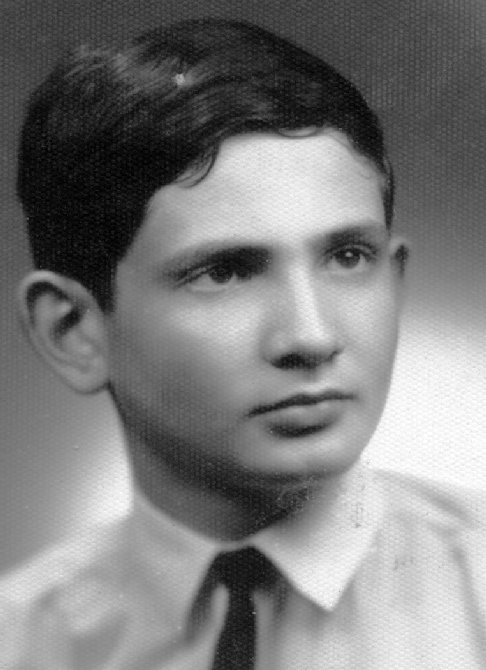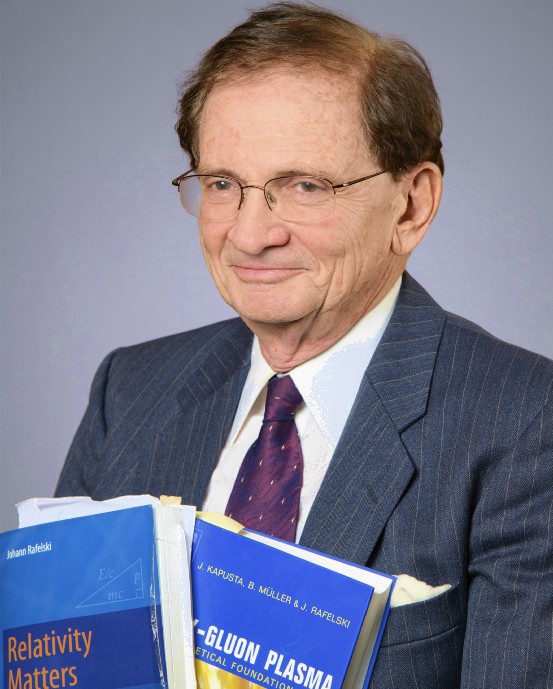

Personal Career
Johann Rafelski is a theoretical physicist, with a Central-European family heritage. A graduate of the JW Goethe Gymnasium in 1968, he studied physics at the JW Goethe University in Frankfurt, Germany, where he received his Ph.D. in the spring of 1973 working with Walter Greiner.
In 1973 he began a series of postdoctoral fellowships: first at the University of Pennsylvania (Philadelphia) with Abraham Klein, then at the Argonne National Laboratory near Chicago where he worked with John W. Clark of Washington University in St. Louis and Michael Danos of the National Institute of Standards and Technology. In spring 1977 Rafelski visited GSI Center for Heavy Ion Research in Germany, and continued on to a fellowship at CERN, where he worked with Rolf Hagedorn and John S. Bell. Rafelski remains associated with CERN to this day.
In the fall of 1979 Rafelski was appointed tenured associate professor at the JW Goethe University where he worked with Berndt Müller of Duke University and Brookhaven National Laboratory. Rafelski then accepted the chair of Theoretical Physics at the University of Cape Town where he created a Theoretical Physics and Astrophysics Institute before following Peter Carruthers to join The University of Arizona in the fall of 1987. While at The University of Arizona: he worked with Robert L. Thews, his University of Paris friend Jean Letessier, and many students.
Research
Rafelski works in several disciplines of subatomic physics to further the understanding of the nature of the quantum vacuum. He investigates the behavior of matter under extreme temperature conditions and the effect of the strongest forces. Under such conditions, the quantum vacuum fluctuations being drastically modified, allow the empty space to be experimentally investigated.
With collisions of relativistic heavy ions = atomic nuclei one can lay the groundwork for such investigations. Rafelski, as a scientist at CERN, has advanced the creation and development of this new research program. The temperatures reached in laboratory - 300 million times hotter than the surface of the Sun - can transform nuclear matter into hot plasma phase consisting of quarks and gluons.
In his scientific work addressing the behavior of the new quark-gluon state of matter, Dr. Rafelski deals with transformation processes of energy into matter and antimatter. Much of this effort is devoted to study of the of strange quarks and anti-quarks. These particles allow conclusions to be drawn on the creation and properties of quark-gluon plasma.
In investigating the behavior of individual particles under extreme conditions, Dr. Rafelski is especially interested in the effect of radiation, seen in the context as a vacuum frictional force caused by acceleration -- the force field energy is converted into matter and antimatter. These processes help in the search for the mechanisms causing the formation of quark-gluon plasma in elementary collisions, and of intense radiation generated by laser pulses.
Other areas of research that interested Dr. Rafelski in the past decade include: the postulated cosmic neutrino microwave background; vacuum fluctuations caused by elemental forces and their relation to dark energy; dark matter in the form of massive compact ultra-dense objects (CUDOs); and the application of laser pulses of high intensity in nuclear fusion.
These research programs have led to the publication of a large number of scientific publications, the involvement of many students, and presentation of research textbooks. While teaching Dr. Rafelski enjoys introducing classical and quantum relativity theory, leading on to above fields of research. In his book, Relativity Matters (Spring 2017), he introduces some of the above research topics and resolves common elementary misconceptions.
Recognition
Dr. Johann Rafelski is a Fellow of the American Physical Society (APS). In 1990, he received a medal from the College de France for his presentation of strangeness in quark-gluon plasma, and in 2008 he was an Excellence Professor of the German Research Foundation (DFG). Dr. Rafelski is a Fulbright Fellow from 2019 to 2020 (during summers hosted by the Wigner Research Centre for Physics in Budapest). Prof. Rafelski has been elected to the Senate of The University of Arizona for the period 2018-2020.
